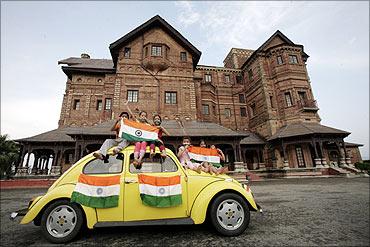Photographs: Reuters T N Ninan
If the government can get even a minimalist agenda going while improving its management of infrastructure, and if the RBI can cut interest rates quickly, the Indian script for 2012 could change, says T N Ninan.
Virtually all of the last year has been hostage to the Euro crisis, while in the United States there was talk till recently of a double-dip recession.
As a troubled year draws to a close, and while Corporate India believes that 2011 has been worse than 2008, the global news may already have become more cheerful.
That means 2012 could end up being much better for the world economy than anyone could have hoped. Consider the straws in the wind.
In the US, housing starts moved up 9.3 per cent in November, and the index of builder confidence has reached its highest level in more than four years.
While house prices are 4.7 per cent lower than a year ago, rentals are up. Finally, housing inventory has dropped more than 25 per cent from its July 2008 peak. Taken together, these signal a housing market recovery that looks sustainable.
. . .
Why 2012 may be GOOD for Indian economy
Photographs: Reuters
Then, unemployment has fallen to its lowest level in two-and-a-half years.
Third, there is manufacturing output -- which dipped fractionally in November, but grew for the six months before that.
Finally, retail sales have continued to grow for the sixth month in a row.
The overall picture is unmistakable -- the US economy is gaining steam.
Growth may still be slow, at an annual rate of 1.8 per cent, and some macroeconomic numbers don't look good yet (unemployment is still high at 8.6 per cent), but most numbers look better than they were six months ago.
. . .
Why 2012 may be GOOD for Indian economy
Photographs: Reuters
What about Europe? Despite forecasts about its imminent demise -- mostly from Anglo-American economists and commentators -- the euro is still alive and functioning, as member-countries have stuck to an action plan scripted mainly by Germany and to a lesser degree by France.
Bond rates may have risen in Italy to a level that everyone says is unsustainable for a slow-moving economy, but there has been no financial meltdown so far. Importantly, three key Southern European governments have changed in the last few months -- Spain, Greece and Italy -- with two of the changes happening under direct German/European pressure.
The new governments have laid out salvage plans with strong reformist agendas, and have got legislative support.
In other words, the troubled southern half of Europe is on the mend. As a sign of confidence that catastrophe will be avoided, no one is looking to leave the #8364 rather, 10 more countries are willing to sign on to tighter EU rules on fiscal discipline.
. . .
Why 2012 may be GOOD for Indian economy
Photographs: Reuters
And now the European Central Bank has stepped in with a major support measure for banks. In each phase of the crisis, the steps taken have been seen to be inadequate, so whether Armageddon will be avoided eventually is still anyone's guess.
But as in the US, the picture looks more hopeful now than at any earlier stage in 2011.
As for the third large economy, China, growth next year is forecast at more than eight per cent -- with much talk of re-orienting the direction of growth inward, towards consumption, which should help rebalance the world economy.
There has been legitimate concern about the housing bubble imploding, and the credit market's problems, but as always, Chinese government spokesmen display none of the nervousness expected by western commentators.
. . .
Why 2012 may be GOOD for Indian economy
Photographs: Reuters
So the global economic environment in 2012 could be more upbeat than in 2011, even if growth is slow.
For India, the positive fallout of the slump in 2011 is that commodity prices have fallen and helped lower inflation.
Now that the rupee has slipped, exporters will find the going easier.
If the government can get even a minimalist agenda going while improving its management of infrastructure, and if the Reserve Bank of India can cut interest rates quickly, the Indian script for 2012 could change.







article